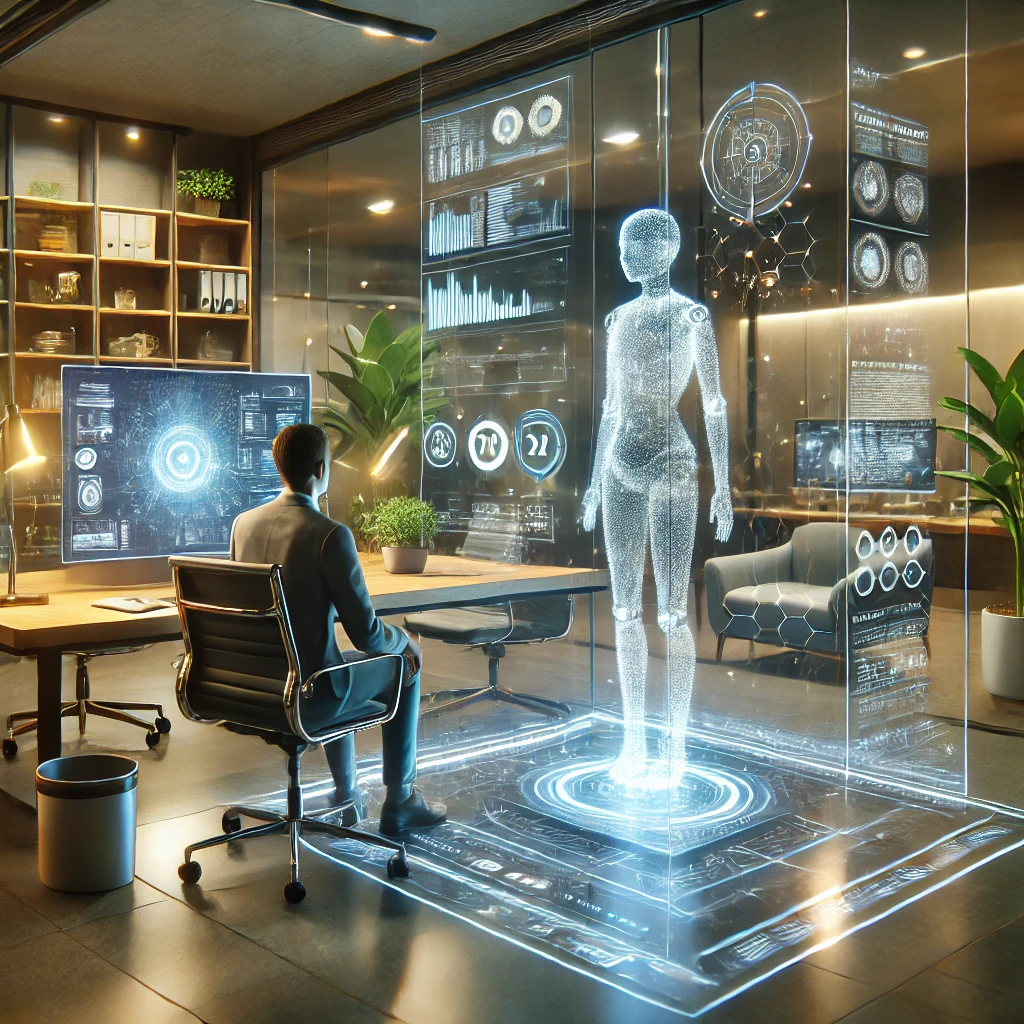Kognetiks Chatbot – The Deep Dive Podcast – 2024 10 14
Welcome to an exciting edition of The Deep Dive Podcast! In this episode, we venture into the fascinating world where AI meets WordPress, exploring the powerful synergy between artificial intelligence and human expertise. Our hosts break down the truths and misconceptions about AI’s impact across industries like healthcare, finance, and law enforcement, while also examining how AI tools like the Kognetiks Chatbot are enhancing—not replacing—human creativity and decision-making. Whether you’re a tech enthusiast or just curious about how AI is reshaping our world, this conversation will give you fresh insights into the future of human-AI collaboration.
Host-1: You know it’s crazy right, AI used to feel like I don’t know something out of Star Trek or something right and now it’s like everywhere you turn.
Host-2: It’s ubiquitous.
Host-1: Yeah, like we’ve got articles here about AI in healthcare, archaeology, even like composing movie scores.
Host-2: It’s really remarkable the speed and the breath of AI‘s entrance into so many fields.
Host-1: It’s overwhelming so how do I even start to make sense of all of it?
Host-2: I think it’s really important to remember that as with anything that seems too good to be true, right AI has its limitations. It’s not a magic bullet that’s gonna solve all of our problems overnight.
Host-1: Oh okay, so you’re saying we need to be careful about the hype like what can AI really do then.
Host-2: Well, the reality is that AI is exceptionally good at very specific tasks, especially those that involve processing massive amounts of data. Like think about giving a detective this incredibly powerful like super magnifying glass. It doesn’t make them any less of a detective, right, it just gives them a much more enhanced tool for doing their job.
Host-1: So it’s not that the AI is suddenly thinking like Sherlock Holmes, it’s that AI has gotten really really good at the stuff humans aren’t as good at like. What was it that article about AI being used to find cancer cells in medical images?
Host-2: Yeah, the amount of visual data that AI can process in a medical image in a really short amount of time, a human doctor would be sitting there for you know hours on end trying to do that and I can do it much much quicker and sometimes with even greater accuracy because it can pick up the subtle things.
Host-1: That is wild. It’s potentially life-saving right? But, then the article also said that AI isn’t going to replace doctors anytime soon, so which is it is it, a medical marvel or not?
Host-2: Well, that’s what we really have to understand these nuances with AI. So you’re right that AI can be a powerful tool in healthcare but I can’t replace a doctors expertise entirely.
Host-1: So again it comes back to that idea of AI as a tool to help humans do their job better, not necessarily to replace humans altogether.
Host-2: Exactly, it’s not a replacement for human judgment, t’s about collaboration.
Host-1: Collaboration, got it. So where else are we seeing this kind of collaboration between humans and AI.
Host-2: Well, finance is a really good example. I mean, imagine being able to sit through like years and years of financial data, news articles, social media sentiment, and sort of trying to track market trends and stuff, all in like real time.
Host-1: Talk about information overload, but I can handle that right?
Host-2: Yeah.
Host-1: So are you saying we should all just handover our investment portfolios to algorithms and like hope for the best?
Host-2: Well not quite, that’s where a human judgment really comes in financial decisions are complex, it’s not just historical data, you have to consider things like government regulations, you have to think about geopolitical events, even consumer behavior.
Host-1: Stuff can change like that.
Host-2: Exactly. So AI might be able to crunch all that data, but it takes a human to connect the dots to make those really tough decision.
Host-1: Like to weight the risks, right, because not everything in finance is just about the number sometimes you have to go with your gut too.
Host-2: Precisely. AI can give you data, it can’t give you intuition or like experience.
Host-1: So even with AI‘s ability to analyze like massive amounts of information, there’s still this need for human judgment, you know, for intuition for experience all those things that come from actually living in the real world.
Host-2: Exactly.
Host-1: Like the more we learn about what I can do the more we realize like what makes us human is pretty important too, you know, like our ability to think critically adapt to new information.
Host-2: Our creativity.
Host-1: Yes, all that stuff. It’s not just about, like crunching numbers, it’s about understanding the story behind the numbers.
Host-2: Absolutely.
Host-1: Okay, so we’ve talked about AI and healthcare. We’ve talked about AI and finance. What about something like, I don’t know, law-enforcement?
Host-2: There has been a lot of talk about using AI to help predict, like crime hotspots.
Host-1: Really! So, like a crime report but in real life that’s both kind of cool and kind of creepy, don’t you think?
Host-2: Well again, it comes down to like AI‘s ability to recognize patterns, but we can’t forget that AI lacks things like moral judgment and ethical decision-making.
Host-1: Which are kind of important in law-enforcement. I mean, you don’t want robots making arrests, right?
Host-2: Exactly, you still need human officers who understand the nuances of a situation, you know to de-escalate things, build trust in communities.
Host-1: Right, because at the end of the day law-enforcement is about people and AI can’t replicate things like, like what you call empathy.
Host-2: Yeah, or ethical reasoning.
Host-1: Right. All those qualities that are super important for just society. So I’m sensing a theme here. It seems like no matter how good AI gets, there’s always gonna be a need for human judgment, human experience, you know all those uniquely human qualities.
Host-2: Absolutely and I think that’s a crucial point into this AI frontier it’s not about being afraid of the technology but making sure that we understand both it’s potential and it’s limitations.
Host-1: And that we use it responsibly. It’s almost like I don’t know, we’re trying to teach like logic to a calculator. I can add up the numbers but like to understand the why behind it all.
Host-2: Yeah. That’s where it gets a little trickier.
Host-1: So, then this is where it gets really interesting I think this conversation about AI because it’s not just about what AI can do, it’s also about like what does it mean to be human when we’ve got these like increasingly intelligent machines, right>
Host-2: Yeah, I mean it’s really you put it that way because AI in a way is forcing us to examine what it means to be human.
Host-1: Right, it’s true like all those things we thought we’re like inherently human are those things actually special or kind of computer do it too like creativity for instance, we always thought of creativity as this like uniquely human thing but then you read these articles about like AI writing poetry.
Host-2: Composing music.
Host-1: Yeah, AI art. So is that really creativity or is it something else?
Host-2: Well, this gets the root of like how AI actually learns, right. if you think about it a lot of these AI systems and creative fields, they’re trained on massive, massive data sets of you know existing art, music, literature whatever it might be. And what they’re really doing is analyzing patterns. They’re analyzing structures, relationships between things.
Host-1: So they’re not necessarily coming up with new ideas out of thin air. They’re just really good at like remixing.
Host-2: Reinterpreting existing human creativity in a sense. Think about it like this, if AI learns how to play jazz, it can study all of Miles Davis and John Coltrane‘s music. You can see the chord changes they’re using but it can’t really improvise.
Host-1: Right, like can it feel the music the way they did. I mean that’s the difference isn’t it? Like being technically good and being truly creative.
Host-2: And this is where that human element is still so important. Even in fields where AI is making these incredible inroad, like take journalism for example, AI can be used to write basic news reports now, particularly for things like I don’t know.
Host-1: Sports scores.
Host-2: Sports scores, financial earnings.
Host-1: Yeah. If it’s just data plug it into the template.
Host-2: Exactly, exactly. But what about stories that require investigative research or really nuanced storytelling or the ability to connect with sources on a human level I mean, those are still very much …
Host-1: Human skills …
Host-2: … human skills.
Host-1: Like we always say on the show, AI can give you the information, but we still need humans to make sense of it all.
Host-2: Absolutely.
Host-1: So this brings up a really big question then, how do we make sure that as AI get smarter as we use it more that it’s actually making us better that it’s not you know taking away what makes us human.
Host-2: It’s a balancing act.
Host-1: Like, yeah, on the one hand it’s exciting technology has so much potential but we also have to be really careful to use it responsibly, right?
Host-2: To think about the consequenc.
Host-1: Exactly so how do we find that balance?
Host-2: Well, that is $1 million question and I don’t know if there’s a like a one-size-fits-all answer but I think a good place to start is just acknowledging that this is a conversation that everyone needs to be a part of.
Host-1: Oh, so you’re saying it’s not just up to like the tech people to figure this out.
Host-2: Exactly. This is a conversation for everybody, every part of society.
Host-1: So it’s not just about like the kind of AI rebuilding it’s about what kind of world we wanna live in.
Host-2: One hundred percent, yeah, we have to be having these conversations. We have to be asking these questions and we have to be approaching this with a like a real sense of responsibility.
Host-1: It does feel like a lot of responsibility though you know I mean AI could potentially change like absolutely everything.
Host-2: Oh absolutely, from everything like the job market to like the way your society functions.
Host-1: That’s a little overwhelming to think about so where do we even begin?
Host-2: Well, I think recognizing that we’re in this together is an important first step.
Host-1: So we’re not alone in this, we need to be talking to each other, figuring things out as we go …
Host-2: … and making sure that we’re including as many voices and perspectives as possible in that conversation too.
Host-1: Because the future of AI is really the future of humanity.
Host-2: And it’s the future that we get to decide.
Host-1: It’s kind of both, right, like empowering and also a little scary because it means we’re not just along for the ride like we can actually help steer things. So okay, big picture time. What are the big takeaways here about AI and you know what it means for us humans?
Host-2: Well, I think one of the biggest takeaways is that we shouldn’t be afraid of AI replacing us. It’s more about how AI can help us to, I don’t know, live better lives. Like think about education for instance, AI could help create personalized learning experiences for every student which would free up teachers to do more like mentoring or focus on things that require more creativity.
Host-1: That makes sense.
Host-2: Healthcare, right, AI can help doctors diagnose things quicker more accurately.
Host-1: So it’s like AI can handle the stuff that like computers are good and then humans can focus on the stuff that humans are good at, all that creative problem-solving emotional stuff exactly.
Host-2: I mean it’s really about, like you said, playing to our strengths.
Host-1: Right, AI is good at crunching data, recognizing patterns, but humans were good at connecting with each other, making judgment calls, thinking outside the box.
Host-2: Yeah, it’s about shifting from this idea of like competition to collaboration.
Host-1: Collaboration.
Host-2: Because AI is a tool, it’s not a replacement for us.
Host-1: A tool, I like that. So how can we make sure we’re using this tool responsibly?
Host-2: Well, we have to talk about the ethics of it. We need to be thinking about things like bias in algorithms, data privacy, we need to make sure that this technology is being developed and used in a way the benefits everyone.
Host-1: So again, it’s not just about the technology itself it’s about the choices we make, the questions we ask.
Host-2: Exactly.
Host-1: I mean wow we’ve covered a lot of ground today. From like self-driving cars to AI writing screenplays. It seems like the possibilities are like endless but AI is also like a huge responsibility.
Host-2: It is, but it’s responsibility we all share.
Host-1: It’s up to all of us to figure out how to shape this technology and use it to make the world a better place.
Host-2: Well said.
Host-1: And on that note, we’ll leave you to ponder all of this. This is the deep dive of signing off.
As we’ve explored today, AI isn’t about replacing humans – it’s about empowering us. The Kognetiks Chatbot is a perfect example of how AI can revolutionize your website by offering intelligent navigation, voice-activated assistance, and personalized interaction. Take the first step toward elevating your digital presence with this cutting-edge tool. Don’t just imagine the future of web engagement – be a part of it! Download the Kognetiks Chatbot for WordPress today and bring AI-powered innovation to your site.
This podcast was generated using NotebookLM, a new and experimental product from Google.
#AI #Chatbot #Kognetiks #WordPress #NotebookLM
About the Author
Stephen Howell is a multifaceted expert with a wealth of experience in technology, business management, and development. He is the innovative mind behind the cutting-edge AI powered Kognetiks Chatbot for WordPress plugin. Utilizing the robust capabilities of OpenAI’s API, this conversational chatbot can dramatically enhance your website’s user engagement. Visit Kognetiks Chatbot for WordPress to explore how to elevate your visitors’ experience, and stay connected with his latest advancements and offerings in the WordPress community.



Leave a Reply
You must be logged in to post a comment.